Should College Education Be Universally Free?
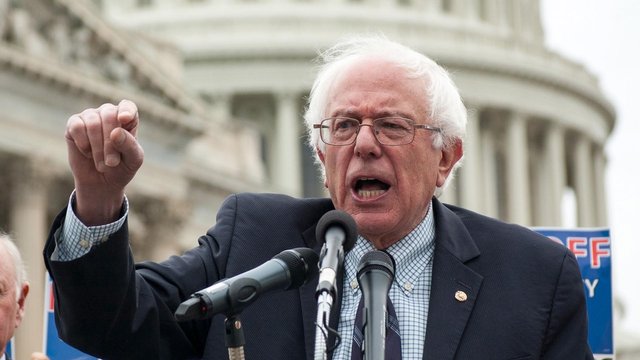
The value of a university degree is currently at an all-time high. Meanwhile, tuition prices are ever-rising while wages for working-class Americans continue to stagnate. Is it society's responsibility to shoulder the increasing cost of higher education?
Arguments for free university
It's pretty easy to see why we should allow for a free public university system. It's a human right to seek out higher education, and no one should be denied that right simply due to the inability to afford it.
There's not that so downside in having an extremely well-educated populous:
- Huge reductions in crime.
- Huge reductions in poverty.
- Huge advancements in technology.
A society stands to gain a lot by having its citizens be as educated as possible. Denying them that right simply sets us back. We've seen free college systems work elsewhere, like in Germany, Norway, Denmark and Sweden. All of these countries have free university systems, and they also all have thriving economies and low rates of unemployment. It can be done.
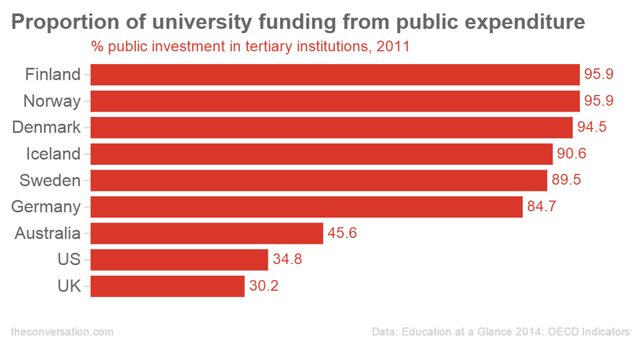
In the U.S. right now, for those aged 25 to 34, we are ranked 14th in the world in terms of having college degrees. Right now, the U.S. has the 4th most expensive college tuition. In the rest of the developed world, governments usually pay for 70 percent of tuition expenses, but here in the United States we only pay for 38 percent.
We're not allowing our university system to be accessible. A lot of people complain about how expensive and how costly it would be to make higher education free, but surprisingly it's actually extremely inexpensive: to open up and make public universities free in America, it would cost us $63 billion. Now, that sounds like a lot, but let's put it in perspective: the government spends over $69 billion in financial aid each year to students. Therefore, making college free would actually be less expensive than the financial aid we're already giving out.
Allowing people to pursue college degrees regardless of their financial status will help soften income inequality. Currently, inequality in this country is as bad as it has ever been. As you probably know, the ability to move up the social hierarchy within our society is not very mobile, to say the least. Those who have college degrees make $675,000 more over the course of their lifetime than somebody who does not have a degree. The ability to seek out higher education and attain a college degree leads to a higher quality of life and a greater income, which people then pump back into the economy to create a better, thriving society.
Maybe the number one reason why we should have a free college system is the enormous student debt in this country. Right now, the U.S. has a national debt of $18 trillion, but $1.3 trillion of that is due to the student debt crisis. Debt is a drag on society and it's crippling on the economy. We can stop creating more debt by making public universities free.
Graduates are coming out of school with this exorbitant amount of debt that they have to pay off, so they spend their salaries paying off their student loan debt instead of buying things and pumping that money back into that economy. Not only that, but parents don't spend their incomes because they're busy saving money to afford to pay for their kid's future college education. What if they didn't have to? What if people didn't have to pay student loans? What if parents didn't have to save up for their children? You'd see a lot of that money being pumped back into the economy, and we would create a stronger economic environment for this country. We'd see more businesses thrive because there'd be more disposable income for people to spend.
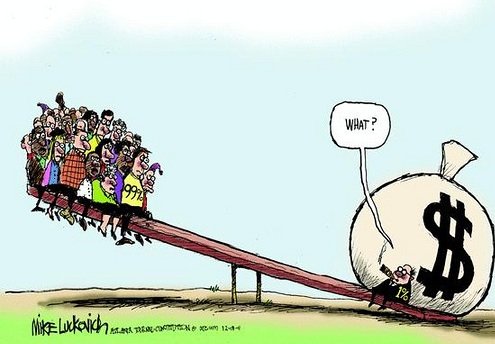
We talked a lot about the financial aspect, but really it's a moral issue. It is an ethically imperative to allow people to attend university, and not be barricaded from education simply because they can't afford it. We need to make public college free, so that we can enjoy the many benefits of a highly educated society.
Arguments against free university
We need to seperate rhetoric that sounds good versus what would actually happen in reality. If politicians are pitching something purely on an emotional basis, something must be wrong. The U.S. educational system, according to the PISA assessment which ranks the educational attitudes of 15 year olds in sixty-five countries, has the U.S. education system as 36th in the world. But if you were to go and look up the top ten universities in the entire world, you'd notice that nine out of ten of then are either the United States or the United Kingdom. What do they have in common? You pay to go there.
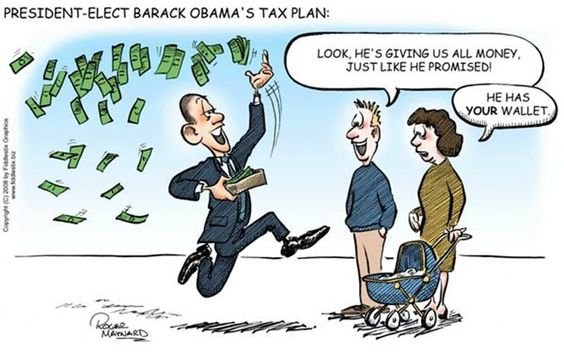
Let's get this out of the way: nothing is never actually free. If we implement free college, someone will be paying for it (and that someone is us). But beyond the financial argument, let's look at the other reasons why this policy doesn't make sense.
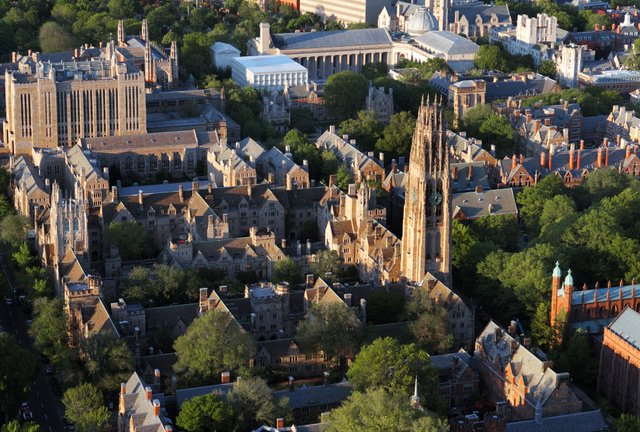
We may be hurting the very people we're trying to help with a free public university proposal. Making public university free would still leave private universities, but the quality of these amazing private universities (e.g. Yale, Harvard, etc.) would quickly diminish greatly due to the fact that since public university is now free, private university would have to cut costs immensely to keep up. We would no longer have the top university system in the world. You'd likely see the American private university system deteriorate to the quality of our current public education system.
The simple fact of the matter is that college isn't for everyone. There's some people who simply don't belong in college, and if you make it free, you're going to be putting a lot of people in a classroom who don't belong there, reducing the quality of education for everybody else.
Right now, once people graduate from college, they're already having a very hard time finding a job or career. If we make college free, we're going to see unemployment rise even more for those who are college graduates because of simple demand-and-supply economics: the more people who graduate college, the more obsolete a college degree actually becomes.
Jobs that previously only required a bachelor degree will now require a masters degree. So then are we going to go and make graduate school free too? If you induce people to go to college that shouldn't belong there, you're going to make the college degree obsolete just like how the American high school degree has essentially become obsolete within the last ten or twenty years.
There have been plenty of studies that have already indicated that the return on investment of obtaining a college degree is a net positive, meaning that you make back more money than you pay for university. It's still a worthwhile investment, which means that reducing the cost of college to nothing doesn't necessarily make a lot of sense. As we've touched upon previously, you may be hurting the very people you are trying to help.
The main argument for making college free is so that everybody can attend regardless of financial circumstance. However, what may end up actually happening is that we screw over those who aren't well-off. The rich may look and see that public institutions are now free, and decide that they want to go there instead of private institutions. So what you're going to do is create more applicants for these public universities, meaning more competition, so that people who weren't well-off financial and had a smaller pool of people to compete against now have a larger pool, and they may now get shut out of being accepted into a public university. When the rich pay to go to college it creates a surplus, meaning that these institutions now have more money that they can dump back in aid, so that those who aren't as well off financially can go to college; it's actually a system that works out rather well.
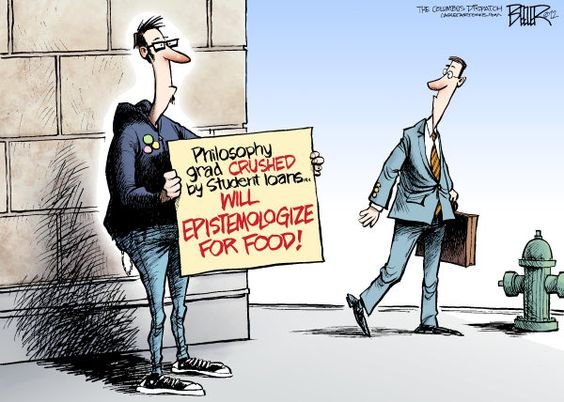
I know a lot of people are really upset about the $1.3 trillion in student loan debt, so in your head it's making college for free sound like a great idea. But you need to understand why universities are so expensive in the first place: within the United States, it's because the government has subsidized a lot of our univeristiy system.
Think of it this way: if you make candy bars and you know that the government is going to loan anyone whatever money they need to buy your candy bars, instead of selling it for $6.00, why not raise the prise to $60? That is exactly what is happening with increased financial aid and rising tuition.
I know a lot of people like to use Germany's free university system as an example, but the reason why the free college system works so well in Germany is due to their high emphasis on the vocational training, which is essential their apprenticeship program. Fifty-one percent of people aged 22 or under in Germany have completed an apprenticeship program, meaning they've attained a certificate for some kind of vocational training. A lot of German jobs don't need a college degree because the focus has is on vocational training. Maybe if the U.S. followed suit, it could stand to benefit a lot more by putting more focus and attention on its vocational training, which is relatively lacking.
While a free tuition policy may sound good on the surface, when we explore the issue at a deeper level it makes sense as to why this is not a good idea.

Which side of the debate are you on?
Where do you stand on this issue? I know it's a very contentious issue within America right now, but it's a very important one. I've made this post to create an open dialog on the issue itself and to hear what other people think.
Steemitchat_COM_VeriFyUseRNaMe_@582e7RMThUXQOZ)0x*iDrLmnlBA6HvfPFdSg31sGIE^cb$yqW
I think there are some great points for and against "free" education. That being said, there is no such thing as free, somebody has to pay for anything that is "free."
Very well, but if nothing is done here, is what will happen to steemit: Read this is very important https://steemit.com/steem/@stea90/read-very-important-why-the-market-volume-and-value-of-steem-continue-to-decrease-what-will-happen
Hi! This post has a Flesch-Kincaid grade level of 11.0 and reading ease of 51%. This puts the writing level on par with Michael Crichton and Mitt Romney.